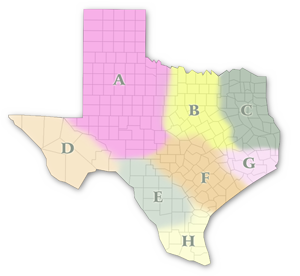


|
The Texas Urban Landscape Guide is a resource of science-based information related to the design, installation, and maintenance of WaterWise landscapes for the principal plant adaptability regions in Texas. Built upon the WaterWise principles:
Appropriate plant selection: Select trees, shrubs and groundcovers based on their adaptability to your region's soil and climate. Texas is blessed with an abundance of beautiful native plants which are naturally adapted to the region. Most have lower water demands, fewer pest problems and less fertilizer needs than many nonadapted, exotic plants brought into Texas landscapes. Use our PlantSelector to determine which plants are best adapted for your region.
Planning and design: Creating a water-efficient landscape begins with a well-thought-out landscape design...
Soil preparation: Preparation of the bed areas for annuals and perennials and planting holes for trees and shrubs is crucial to their survival...
Practical turf areas: Turf areas are important to the well-balanced urban landscape. Select the appropriate grass species and consider the size and geometry of turf areas for optimal water use...
Efficient irrigation: Of the tremendous amounts of water applied to lawns and gardens, much of it is never absorbed by the plants and put to use. Some water is lost to runoff by being applied too rapidly, and some water evaporates from exposed, unmulched soil; but, the greatest waste of water is applying too much too often.
|
 Use of mulches: Use a mulch wherever possible. A good mulch conserves water by significantly reducing moisture evaporation from the soil. Mulch also reduces weed populations, prevents soil compaction and keeps soil temperatures more moderate.
Landscape water conservation: A number of different approaches can help utilities promote and achieve irrigation efficiency. From setting appropriate water budgets for landscapes to surveying irrigation and dedicated meters, ensuring proper irrigation system design and setting irrigation system standards are addressed in this section.
Appropriate maintenance: An added benefit of WaterWise landscapes is less maintenance. A well-designed landscape can decrease maintenance by as much as 50 percent through reduced mowing; once-a-year mulching; elimination of weak, unadapted plants; and more efficient watering techniques.
|
Originating in Colorado under the title, "XeriscapeTM," WaterWise landscaping approaches combine seven principles of good landscape practices to produce water efficient landscapes. These landscapes are an attractive alternative to the turfgrass lawn which does not always perform well in areas with rocky soil, high summer temperatures and long periods without rain1. Does this sound like anyplace in Texas? By proper planning, design, soil analysis and amendments, appropriate plant selection, efficient irrigation techniques, appropriate use of turf, mulches, and maintenance, a successful, appealing landscape can be developed without increasing peak summertime demands on our stressed water systems. The seven principles of water wise landscaping are described herein, along with summary programmatic and ordinance approaches which can assist utilities engaged in implementing best management practices for water conservation. A key element in planning the WaterWise landscape is the selection of environmentally-appropriate plants. Our PlantSelector database is "regionalized," so that the order in which plants are presented to you varies with your locality. The landscape plants in the database have each been rated by a team of "plant experts" knowledgeable about the best plants for their regions. We hope this online resource helps you better plan YOUR Water Wise landscape! Resources:  Water Conservation Task Force Best Management Practices Guide Water Conservation Task Force Best Management Practices Guide
Click here to download the free Acrobat Reader |